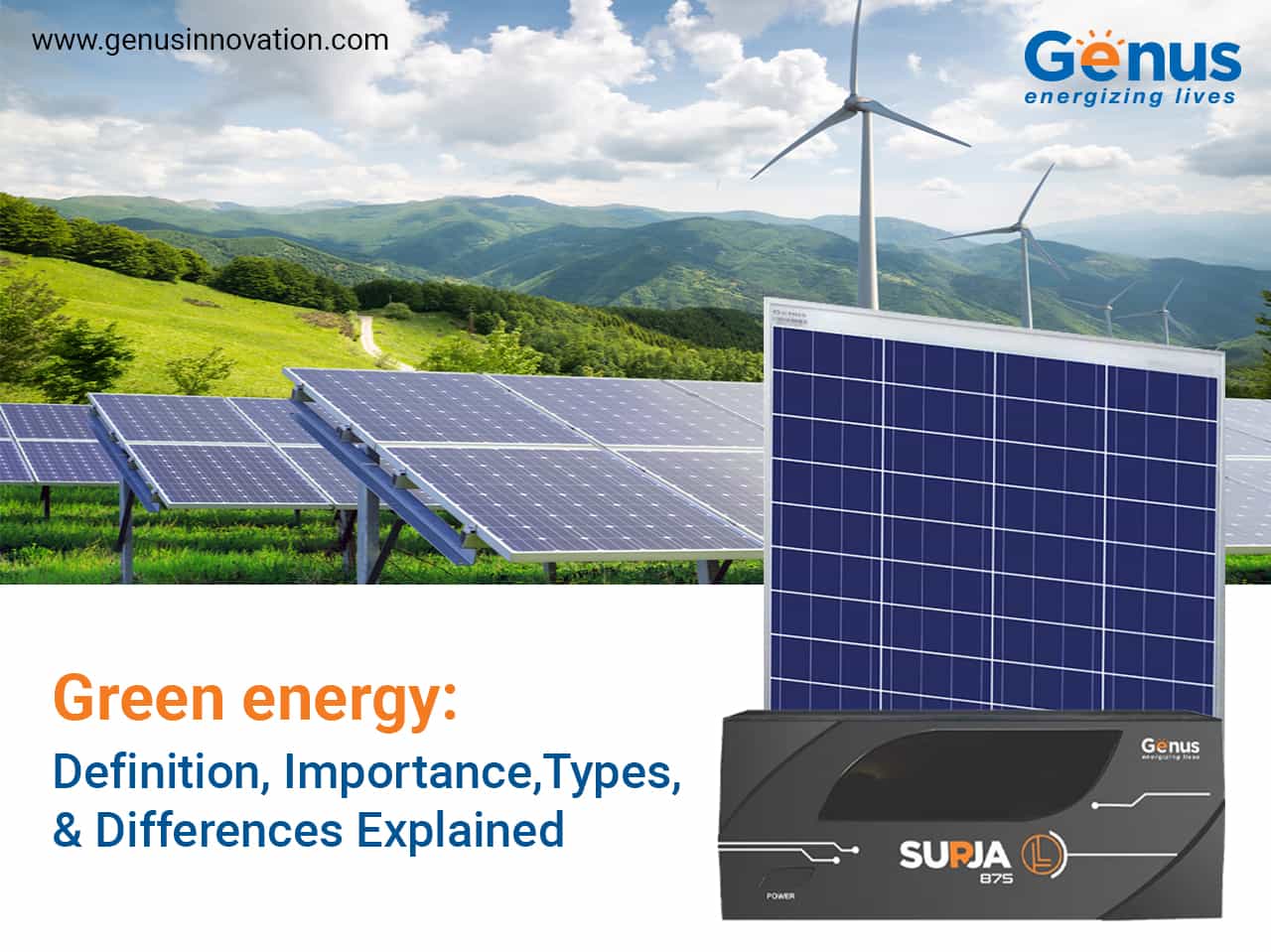What Is Green Energy?
Green energy, or green power, refers to energy derived from natural sources such as sunlight, wind, and water. These resources are abundant and renewable, ensuring that no harmful greenhouse gases are released during their generation. At Genus Innovation, we harness green energy as part of our commitment to sustainable solutions. Our solar products for homes are designed to maximize efficiency while contributing to a healthier planet.

How Does Green Energy Benefit the Environment?
Adopting green power offers numerous environmental advantages:
- By replacing fossil fuels with cleaner alternatives like wind, water, and sunlight, we significantly reduce pollution levels.
- Throughout their lifecycle, green energy sources release minimal amounts of greenhouse gases, helping preserve ecosystems and mitigate climate change.
- These energy solutions tend to be cost-effective and stable due to local production. They remain unaffected by global price fluctuations or geopolitical tensions, ensuring reliable access to power.
- Economic growth is another positive outcome, with industries creating millions of jobs annually—11 million worldwide in 2018 alone (TWI Global).
- With decentralized systems like solar panels, communities gain greater resilience against extreme weather events while enjoying flexible energy management options.
- Finally, embracing green energy provides affordable energy access globally, fostering development without compromising future generations’ welfare.
What Are the Different Types of Green Energy?
Several distinct forms of green energy exist, each leveraging unique natural phenomena:
1. Solar Energy
Solar power draws directly from sunlight—a clean, limitless resource. Stars generate immense amounts of energy through nuclear fusion, converting lighter atoms into heavier ones under extreme conditions. This reaction releases vast quantities of light and heat, some of which reaches Earth as solar radiation. We capture this energy using photovoltaic cells within solar panels. When sunlight strikes these cells, electrons move, producing direct current (DC) electricity. An inverter converts DC into alternating current (AC), making it suitable for powering homes and appliances.
For instance, our Genus solar systems offer high-efficiency solutions tailored specifically for residential settings. Switching to solar not only conserves finite resources but also reduces utility expenses over time.
2. Wind Energy
Wind turbines harness kinetic energy from moving air masses. Unlike traditional methods reliant on coal or oil, wind farms produce zero emissions during operation. Moreover, modern designs minimize noise pollution and visual impacts compared to earlier models. By investing in advanced technology like Genus tubular batteries, users enjoy extended operational lifespans alongside superior performance metrics.
3. Hydroelectric Power
Hydropower captures potential energy from falling or flowing waters. Dams store vast volumes of liquid until needed, releasing controlled streams through turbines connected to generators. Once operational, these facilities deliver steady baseload capacity while maintaining low maintenance costs. Additionally, small-scale installations support rural electrification efforts across developing regions.
4. Biogas
Biogas arises naturally during anaerobic digestion processes involving organic residues such as kitchen scraps, animal excrement, or agricultural waste. Under sealed conditions devoid of oxygen, microorganisms break down raw materials into simpler compounds releasing biogas composed primarily of methane (CHâ‚„). Captured biogas serves multiple purposes including cooking, heating, lighting, and even powering engines. Residual solids left behind after processing retain valuable nutrients ideal for agriculture.
5. Biomass
Biomass represents solid, liquid, or gaseous fuels obtained from recently deceased biological entities including trees, crops, grasses, algae, etc. Through combustion, pyrolysis, gasification, or fermentation techniques, stored chemical energy transforms into usable thermal or electrical outputs. While combustion inevitably produces COâ‚‚ emissions, quantities remain far lower than those associated with petroleum derivatives. Furthermore, sustainable sourcing practices ensure minimal ecological footprint throughout cultivation cycles.
Is There Any Distinction Between Green Energy & Renewable Energy?
Though frequently used synonymously, "green energy" and "renewable energy" carry subtle distinctions. While both categories emphasize sustainability, green energy focuses exclusively on environmentally beneficial outcomes beyond mere renewability. Examples include solar panels shielding habitats from habitat destruction whereas geothermal plants might disrupt local aquifers depending on implementation specifics.
Conversely, renewable energy encompasses broader categories such as tidal streams, wave motion, ocean thermal gradients, etc., whose environmental impacts vary considerably based on scale and location. Regardless, choosing Genus products ensures optimal balance between performance longevity and ethical considerations. Whether outfitting private residences or commercial establishments, we prioritize delivering lasting value backed by cutting-edge innovation.
At Genus Innovation, we lead the charge toward a greener tomorrow by offering state-of-the-art solar solutions supported by unmatched customer care networks worldwide. If interested in transforming your property into an eco-friendly haven, contact us today—we’re here to assist every step of the way!
Ribbon mixer is one kind of slot type mixer for powder and paste. It is widely used in the industries of nutriceutical, chemical, animal remedy, feed additives and food. The main components are U type container, ribbon mixing blades and transmission parts. During the mixing process, the materials in container are doing mixing movement driven by the ribbon spiral mixing blade.
Horizontal Ribbon Mixer,Ribbon Mixer,Ribbon Blender,Ribbon Mixing Machine
Changzhou Lead Machinery Technology Co.,Ltd , https://www.leaddryer.com